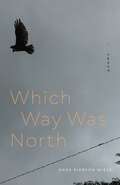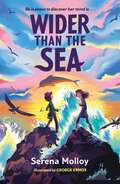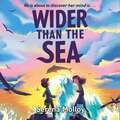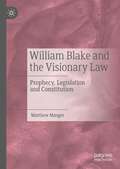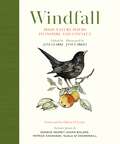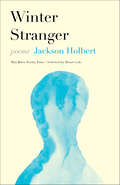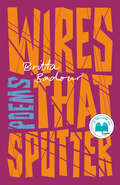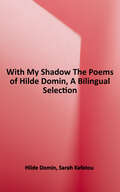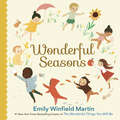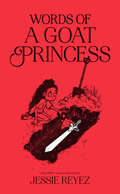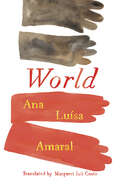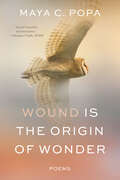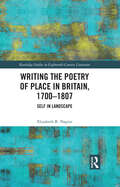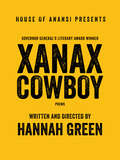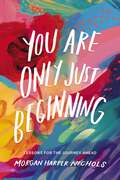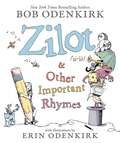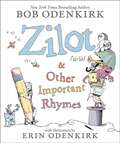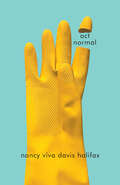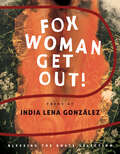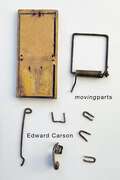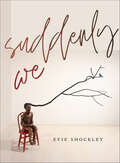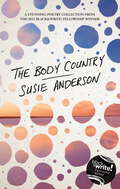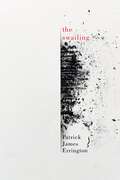- Table View
- List View
When i was in class 10th
by RuchikaRuchika, an introvert who finds solace in writing, began expressing her innermost thoughts through poetry at the age of fourteen. Her diary, once her sanctuary, now unfolds its secrets to the world in this captivating collection. A dedicated educator since 2003, Ruchika holds a Master's degree in Child Care and Education from Alagappa University and a Bachelor's in Elementary Education from JMC, Delhi. Her passion for teaching brings joy to her students, and she feels blessed to nurture young minds. With heartfelt gratitude to Shrija Publishers for bringing her youthful musings to life, Ruchika invites readers to explore the intimate realm of her poetic journey.
Which Way Was North: Poems
by Anne Pierson WieseIn Which Way Was North, Anne Pierson Wiese juxtaposes poems from her years living in New York City with work written after her relocation to South Dakota. By exploring local, historical, and personal sources, she invites readers to see an unmapped territory of the mind informed by these distinct regions of the United States.Suggesting that mundane physical places and daily routines can possess significance beyond the immediate, Which Way Was North offers elements such as wild grapevines and country cemeteries, along with subway preachers and weeds emerging from sidewalk cracks, as vital starting points for reflection. Fundamentally, Wiese’s poems show that our individual powers of observation remain the most life-affirming response to the existential questions posed by our surroundings, regardless of where we happen to call home.
Wider Than The Sea
by Serena MolloyThe powerful tale of a girl who feels broken, and the dolphin who makes her whole. A story of friendship, hope and self-discovery, perfect for readers aged 9+, and beautifully illustrated in black and white by George Ermos.Ró finds school impossible. She knows people think she's shy - and stupid. But when she goes to the bay each afternoon to watch the dolphin leap through the water, she finds the strength to keep going. Then the dolphin disappears, and everything starts falling apart.Can Ró overcome her fears to find him?I watch each rise and dip of wave know Sunny must be out there somewhere wonder if he's missing me. I remember that moment when I touched his skin and know that finding him is the only thing that can make the aching stop make me feel not broken.
Wider Than The Sea: A dyslexia-friendly story of friendship, hope and self-discovery
by Serena MolloyRó risks everything in her search for a missing dolphin, and discovers just how powerful she can be. This uplifting novel in verse will inspire readers of all abilities in its celebration of inclusivity. Perfect for fans of A Kind of Spark.Ró finds school impossible. She knows people think she's shy - and stupid. But when she goes to the bay each afternoon to watch the dolphin leap through the water, she finds the strength to keep going. Then the dolphin disappears, and everything starts falling apart.How much is Ró willing to risk to find him?I watch each rise and dip of wave know Sunny must be out there somewhere wonder if he's missing me. I remember that moment when I touched his skin and know that finding him is the only thing that can make the aching stop make me feel not broken.
William Blake and the Visionary Law: Prophecy, Legislation and Constitution
by Matthew MaugerThis book examines the difficult relationship between individual intellectual freedom and the legal structures which govern human societies in William Blake’s works, showing that this tension carries a political urgency that has not yet been recognised by scholars in the field. In doing so, it offers a new approach to Blake’s corpus that builds on the literary and cultural historical work of recent decades. Blake’s pronouncements about law may often sound biblical in tone; but this book argues that they directly address (and are informed by) eighteenth-century legal debates concerning the origin of the English common law, the autonomy of the judicature, the increasing legislative role of Parliament, and the emergence of the notions of constitutionalism and natural rights. Through a study of his illuminated books, manuscript works, notebook drafts and annotations, this study considers Blake’s understanding that law is both integral to humanity itself and a core component of its potential fulfilment of the ‘Human Form Divine’.
Windfall: Irish Nature Poems to Inspire and Connect
by Jane ClarkeWhat does Ireland's nature poetry say about us as a people? How does it speak to us of our past, our inheritance, the values to which we aspire? What clues lie within its language that connect us to our deeper selves and our place within our communities and environments?As varied as our plants, animals and habitats, Windfall: Irish Nature Poems to Inspire and Connect presents a portrait of an ever-changing vista. Jane Carkill's captivating original illustrations of Ireland's rich and diverse natural world add to the sense of enchantment and wonder.Each poem pays attention to nature while also reflecting on the loves and losses of our everyday lives. Award-winning poet Jane Clarke's selection includes some of our best-known poets, from Seamus Heaney, Eavan Boland, Michael Longley, Paula Meehan, Nuala Ní Dhomhnaill, Eiléan Ní Chuilleanáin and Paul Muldoon.There are poems here to make us laugh and cry, to help us celebrate and grieve; poems to put words on what can seem inexpressible as we connect to the other living beings with which we share this island.
Windfall: Irish Nature Poems to Inspire and Connect
by Jane ClarkeWhat does Ireland's nature poetry say about us as a people? How does it speak to us of our past, our inheritance, the values to which we aspire? What clues lie within its language that connect us to our deeper selves and our place within our communities and environments?As varied as our plants, animals and habitats, Windfall: Irish Nature Poems to Inspire and Connect presents a portrait of an ever-changing vista. Jane Carkill's captivating original illustrations of Ireland's rich and diverse natural world add to the sense of enchantment and wonder.Each poem pays attention to nature while also reflecting on the loves and losses of our everyday lives. Award-winning poet Jane Clarke's selection includes some of our best-known poets, from Seamus Heaney, Eavan Boland, Michael Longley, Paula Meehan, Nuala Ní Dhomhnaill, Eiléan Ní Chuilleanáin and Paul Muldoon.There are poems here to make us laugh and cry, to help us celebrate and grieve; poems to put words on what can seem inexpressible as we connect to the other living beings with which we share this island.
Winter Stranger: Poems
by Jackson HolbertWinner of the Max Ritvo Poetry Prize, Jackson Holbert’s Winter Stranger is a solemn record of addiction and the divided affections we hold for the landscapes that shape us.In the cold, seminal countryside of eastern Washington, a boy puts a bullet through his skull in a high school parking lot. An uncle crushes oxycodone into “a thousand red granules.” Hawks wheel above a dark, indifferent river. “I left that town / forever,” Holbert writes, but its bruises appear everywhere, in dreams of violent men and small stars, the ghosts of friends and pills. These poemsincite a complex emotional discourse on what it means to leave—if it’s ever actually possible, or if our roots only grow longer to accommodate the distance.Punctuated by recollections of loved ones consumed by their addictions, Winter Stranger also questions the capricious nature of memory, and poetry’s power to tame it. “I can make it all sound so beautiful. / You’ll barely notice that underneath / this poem there is a body / decaying into the American ground.” Meanwhile, the precious realities vanish—“your hair, your ears, your hands.”—leaving behind “the fucked up / trees,” the “long, cold river.” In verse both bleak and wishful, Holbert strikes a fine balance between his poetic sensibilities and the endemic cynicism of modern life.“It is clear now that there are no ends,” Holbert writes, “Just winters.” Though his poems bloom from hills heavy with springtime snow, his voice cuts through the cold, rich with dearly familiar longings: to not be alone, to honor our origins, to survive them.
Wires that Sputter: Poems
by Britta BadourA powerful debut collection from an award-winning artist, public speaker, and poet.With propulsive, intimate stylings and an eye toward Black liberations, pop culture, sports, and familial fractures, Wires that Sputter meets the world with the posture of a portraitist and the deftness of a poet-as-acrobat, as seeker. Here in these wondrous poems is an attentiveness toward that which harrows as well as that which heals, toward the power of space-giving and fragmentation. Rupture and recovery, tribute and tribulation, a revivifying musicality, and room to breathe—all dapple these pages, where electricity manifests in every line.
With My Shadow: The Poems of Hilde Domin, A Bilingual Selection
by Hilde Domin“These translations and poems are full of the refugee’s loss and longing, made infinitely richer by Kafatou’s love for the poet and poems. This is a deeply loving, compassionate collection of poems, remaining anchored, ultimately, in the exile’s intertwined desire and nostalgia for home.” —The Massachusetts Review Not to tire / but to hold out your hand / gently / as to a bird / to the miracle This bilingual edition of the poems of Hilde Domin, an outstanding lyric poet of exile and return, brings her work to English-speaking readers for the first time. Hilde Domin fled Nazi Germany when, as a Jew, she was no longer safe there. For many years she lived in Italy and the Dominican Republic, where she encountered modernist currents in Italian and Spanish poetry. Returning permanently to Germany in the mid-1950s, she quickly found recognition as a poet of memory and reconciliation. For the rest of her long life she wrote and spoke in a tone poised between vulnerability and trust, on behalf of moral and civic values worth living for. <p><p>As Sarah Kafatou writes in her Introduction, Domin “is always frugal: she reworks and transforms her repertoire of metaphors, images, themes, and ideas again and again, extending and refining, never explaining too much. Her lyric sensibility is concise, her syntax and vocabulary are simple and apt, her short lines break on the phrase, and she has an uncanny ability to hit the right note at exactly the right moment, according to the rhythm of the breath.” Domin writes of “people like us we among them,” providing a voice for victims of persecution everywhere. Today, with refugee populations on the move throughout the world and with rising intolerance and polarization, these poems of conscience, and courage discovered in desperation, will speak directly to every reader.
Wonderful Seasons
by Emily Winfield MartinCelebrate the seasons with this original board book by Emily Winfield Martin--perfect for baby showers and fans of the New York Times Bestseller, The Wonderful Things You Will Be!From Springtime fun to cozy Winter, this book captures the adorableness of a diverse cast of babies in the beauty of all four seaons. With simple text and irresistable art, this lighthearted book will bring a smile to parents and the youngest readers alike.
Words of a Goat Princess
by Jessie ReyezA moving poetic debut from a talented artist, Words of a Goat Princess is everything you love about singer/songwriter Jessie Reyez—her rawness, her love affair with the ugly truths of humanity, and so much more.Words of a Goat Princess is the debut poetry collection about life’s struggle and triumphs from Grammy-nominated and JUNO-award winning songwriter Jessie Reyez.With the authenticity and heartbreaking relatability that her fans know and love her for, Reyez brings the breadth of her lived experience to the page as few recording artists can. At times ethereal and visceral, these 43 poems are carefully painted moments that expertly explore love, loss, and identity with an artistry that leaps off the page with every turn.Through this collection of poems and stories, Jessie Reyez shows that she is more than a pop performer, she is a true artist whose star knows no limits.
World
by Ana Luísa AmaralPoems of effervescent grace—about nature, magpies, reality, “the unreasons of this world,” and spiders—from one of Portugal’s most beloved poets, published in a beautiful bilingual edition World—Ana Luísa Amaral’s second collection with New Directions—offers a new exhilarating set of poems that convey wonder, bemusement, and an ever-deepening appreciation of life. Weaving the thread that connects the poem to life, World speaks of our immense human perplexity in the face of everything around us and our oneness with it all. As Amaral notes, all of us, “humans and non-humans, are on the same ontological level, the differences being only a matter of perspective. We are all made of the same stuff as dreams—and stars.” Asked about her thoughts on World, Amaral’s peerless translator Margaret Jull Costa replied: “What I take from this collection of poems is a sense of joy in the ordinary—seeing an ant going about its business, or a bee or a fish, or the feeling of sharing a whole history with a particular table, or watching a very ordinary woman sitting on a train playing with the handle of her handbag. World also brings us meditations on colonization, slavery, and whaling. Like the world, it is full of surprises and full of joy and sadness.” These vibrant, exultant poems invite you to share this marvelous world: Yes, all you need (how easy!) is to say yes.
Wound Is the Origin of Wonder: Poems
by Maya C. Popa“Lyrical, beautiful, and descriptive.” —Mandana Chaffa, BOMB “In ravishing, formally exploratory poems, Maya C. Popa wields the lyric like a reparative scalpel, evoking wonder and woundedness in equal measure.” —Meghan O’Rourke Award-winning poet Maya C. Popa suggests that our restless desires are inseparable from our mortality in this pressing and precise collection. Rooting out profound meaning in language to wrench us from the moorings of the familiar and into the realm of the extraordinary, the volume asks, how do we articulate what’s by definition inarticulable? Where does sight end and imagination begin? Lucid and musically rich, these poems sound an appeal to a dwindling natural world and summon moments from the lives of literary forbearers—John Milton’s visit to Galileo, a vase broken by Marcel Proust—to unveil fresh wonder in the unlikely meetings of the past. Popa dramatizes the difficulties of loving a world that is at once rich with beauty and full of opportunities for grief, and reveals that the natural arc of wonder, from astonishment to reflection, more deeply connects us with our humanity.
Writing the Poetry of Place in Britain, 1700–1807: Self in Landscape (Routledge Studies in Eighteenth-Century Literature)
by Elizabeth R. NapierThis book discusses the intrusion, often inadvertent, of personal voice into the poetry of landscape in Britain, 1700-1807. It argues that strong conventions, such as those that inhere in topographical verse of the period, invite original poets to overstep those bounds while also shielding them from the repercussions of self-expression. Working under cover of convention in this manner and because for each of these poets place is tied in significant ways to personal history, poets of place may launch unexpected explorations into memory, personhood, and the workings of consciousness. The book supplements traditionally political readings of landscape poetry, turning to questions of self-articulation and self-expression in order to argue that the autobiographical impulse is a distinctive and innovative feature of much great eighteenth-century poetry of place. Among the poets under examination are Pope, Thomson, Duck, Gray, Goldsmith, Crabbe, Cowper, Smith, and Wordsworth.
Xanax Cowboy: Poems
by Hannah GreenThe Xanax Cowboy has a reputation like a rattlesnake. She might as well be a strike-anywhere match in a gasoline town. Her whiskey is mixed with vengeance like her mind is mixed with pills. The last doctor who told her she ain't nothin' is still spitting blood through a split lip.
You Are Only Just Beginning: Lessons for the Journey Ahead (Morgan Harper Nichols Poetry Collection)
by Morgan Harper NicholsFind the inspiration you need to embrace your next adventure in life with confidence.It can be difficult and scary to take that first step into your future and surrender to the unknown. This illustrated collection of poetry and essays will empower you to strike out on your journey with courage and grace, drawing on invaluable lessons from nature.In You Are Only Just Beginning, popular Instagram poet and bestselling author Morgan Harper Nichols reimagines the classic heroine's journey—from the very first call to adventure, through trials, hardships, and new relationships, all the way back home—and offers key lessons and affirmations to encourage and equip you every step of the way.As you travel your own journey of self-discovery, you're invited to:Cultivate the courage you need to follow your passionsDevelop curiosity about the natural world around youFind comfort and inspiration for the inevitable trials on your journeyReflect on how your past has prepared youStep out in wonder and faith, knowing there is more for you Morgan's signature art fills every page of You Are Only Just Beginning, making it a gorgeous addition to your bedside or coffee table. This is a beautiful and empowering gift to give yourself or others for birthdays, holidays, graduations, or New Year's—any time there's a new beginning ahead.You cannot control all of what's to come, but You Are Only Just Beginning will help you see that what you need for the journey ahead is already embedded in the world around you. Come and find the courage to honor your soul's divine cravings—to step out in faith knowing that goodness and Grace are never far away. The unknown waits for you and now is the time to go.Follow Morgan on Instagram @morganharpernicols (along with her millions of followers), and look for more beautiful, thought-provoking poetry in her other collections:All Along You Were BloomingHow Far You Have Come
Zilot & Other Important Rhymes
by Bob OdenkirkEmmy Award-winning and New York Times bestselling writer, comedian, and actor Bob Odenkirk and his daughter, illustrator Erin Odenkirk, present poetic nonsense for all ages perfect for fans of Shel Silverstein and Jack Prelutsky! Bob Odenkirk began writing these poems with his children when they were little, compiling the poetry into a homemade book entitled Olde Time Rhymes. He wanted Nate and Erin to understand that actual people had written the books the family loved to read and to instill in them the feeling that they could be writers and illustrators themselves. Almost twenty years later, when the Odenkirks found themselves quarantined under the same roof, they revisited these mostly silly, sometimes poignant works. It wasn't until Erin began to create illustrations to accompany the words, though, that the book grew to be something much bigger than an Odenkirk family treasure. From the titular made-up word for a blanket fort, an adorable dog with a penchant for the zoomies, and a father teaching his kids how umbrellas work, the subjects of these works, complemented by Erin&’s whimsical and detailed linework, come alive on these pages. Featuring over seventy poems, Zilot & Other Important Rhymes will delight readers young and old.
Zilot and Other Important Rhymes
by Bob Odenkirk Erin Odenkirk Nate Odenkirk Naomi OdenkirkEmmy Award-winning and New York Times bestselling writer, comedian, and actor Bob Odenkirk and his daughter, illustrator Erin Odenkirk, present poetic nonsense for all ages perfect for fans of Shel Silverstein and Jack Prelutsky! <p><p>Bob Odenkirk began writing these poems with his children when they were little, compiling the poetry into a homemade book entitled Olde Time Rhymes. He wanted Nate and Erin to understand that actual people had written the books the family loved to read and to instill in them the feeling that they could be writers and illustrators themselves. Almost twenty years later, when the Odenkirks found themselves quarantined under the same roof, they revisited these mostly silly, sometimes poignant works. It wasn't until Erin began to create illustrations to accompany the words, though, that the book grew to be something much bigger than an Odenkirk family treasure. <p><p>From the titular made-up word for a blanket fort, an adorable dog with a penchant for the zoomies, and a father teaching his kids how umbrellas work, the subjects of these works, complemented by Erin’s whimsical and detailed linework, come alive on these pages. Featuring over seventy poems, Zilot & Other Important Rhymes will delight readers young and old.
act normal (Hugh MacLennan Poetry Series #80)
by nancy viva davis halifaxi might never be no-one that shiny / the beauty of a sequin’d self / what was stitched into heaven’s dropThe poems in act normal use illegibility and wilful uncertainty to evade the grasp of the normative, as endured by those institutionalized by, and through, the concept of normalcy.act normal starts in an institution where children categorized and constructed as intellectually inferior are placed into custodial care. These poems are inquisitive, articulating the entanglements of lives across categories of difference – particularly the lives of those who as children were considered to be other or less than human. Drawing upon conversations, archival materials, court cases, legislation, transcripts, and case histories, among other sources, nancy davis halifax’s poems destabilize categories of meaning – understanding disability and difference as “undecidability.”act normal is a movement of “feelingthought,” unsettling normative expectations and inviting readers to re-orient from the normative task of assuming the safety of consensual interpretation, while risking, cherishing, and performing non-indifference.
fox woman get out!
by India Lena GonzálezTake the body and split it wide open. Fill it with light. See the multiple interiors, the layered death, the familial mythology, the throb and splendor of being, the shedding of the body altogether: this is fox woman get out! Traveling from the corporeal to the cosmic, from life to death and back again, fox woman get out! is a full-throated performance of humanity in search of truth, ancestry, and artistic authenticity. Moving through themes of lineage, twinship, femininity and masculinity, reclamation of Indigeneity, dance, gender roles, and longing, González’s poems are a crescendo on the page. Part ecstatic elegy, part spell, this is a betwixt poetics, a kaleidoscopic, disruptive, and meditative work.
movingparts (Hugh MacLennan Poetry Series)
by Edward Carsonthe body / knows what / it truly / wants yet / the mind / wavers allIn Edward Carson’s provocative new work, the poetic moving parts of movingparts confront and breathe new life into what’s true and what’s not in Aesop’s fable "The Fox and the Crow," as well as the shifting, often fragmentary ground between what’s said and what’s not about identity and intimacy in Sappho’s lyrics.Reflecting the moment-to-moment ways our minds think, these poems take us from a creative process of disconnection and reassembly to a sonic pacing of words arising out of their stillness on the page. A flair for syntactical compression is found throughout, balanced by a capricious yet transforming diction, what John Ashbery described as seeking to stretch “the bond between language and communication.” Calling witness to the narratives of history while pivoting their reach forward to the present, the rhythms, allusions, and resulting outcomes of Carson’s use of language expand both narrative and discovery. movingparts is brought full circle when an unexpected historical connection between Sappho and Aesop is revealed, hinting that what is true or false in the past or present of our lives can arrive at an intimacy with and illumination of more than we imagine.
suddenly we (Wesleyan Poetry Series)
by Evie ShockleyFinalist for the 2024 National Book Award for PoetryIn her new poetry collection, Evie Shockley mobilizes visual art, sound, and multilayered language to chart routes towards openings for the collective dreaming of a more capacious "we." How do we navigate between the urgency of our own becoming and the imperative insight that whoever we are, we are in relation to each other? Beginning with the visionary art of Black women like Alison Saar and Alma Thomas, Shockley's poems draw and forge a widening constellation of connections that help make visible the interdependence of everyone and everything on Earth.perchedi am black, comely,a girl on the cusp of desire.my dangling toes take the restthe rest of my body refuses. spine upright,my pose proposes anticipation. i poisein copper-colored tension, intent onmanifesting my soul in the discouraging world.under the rough eyes of others, i stiffen.if i must be hard, it will be as a tree, alivewith change. inside me, a love of beauty riseslike sap, sprouts from my scalpand stretches forth. i send out my song, an ariablue and feathered, and grow toward it,choirs bare, but soon to bud. i amblack and becoming. —after Alison Saar's Blue Bird
the body country
by Susie Anderson'I keep looking at the stars to see the universe, but the joke is I am the universe.' the body country is an evocative exploration of a world that too often marginalises and the power of a land that can offer connection. A meditation of wandering and wondering on Country, inviting the reader to understand the complexities and changing forms of self and love.A Wergaia and Wemba Wemba woman, Susie Anderson captures profound meaning in moments often lost in the busyness of a day, encouraging us all to stop and allow ourselves the space to notice. To notice the shape of a mouth as it says goodbye; the colour of the sky as you fall in love; the way a steering wheel is turned carelessly after many wines; the crunch of dry ground after drought; the smell of fire on the wind; the movement of ants before rain; the power a word, a dress, a piece of art can give to run towards something new. These are poems that take us across rural and urban settings; from the personal to the universal, from looking inward to mapping the land and always bringing us back to the Country that connects us all.'Anderson pays attention to the moments that slip through the cracks and hands them straight to you in a way that can momentarily stun' Harper's Bazaar'The Body Country is an evocative exploration of a world that too often marginalises and the power of a land that can offer connection. Susie captures profound meaning in moments often lost in the busyness of a day, encouraging us all to stop and allow ourselves the space to notice' Wimmera Mail Times
the swailing (Hugh MacLennan Poetry Series)
by Patrick James ErringtonHere the long edge / of town Low / winter fog / … My breath / my offering We are / our bodies burning Firmly rooted in fire-haunted landscapes that are at once psychological, emotional, and fiercely real, Patrick Errington’s first collection traces the brittle boundaries between presence and absence, keeping and killing, cruelty and tenderness. In these poems human voices whisper through the natural world – a hand turns on a lamp to extinguish the stars; stones outline a sleeping form; a black eye is a storm cloud. Errington stokes vivid images, formal grace, and subtle humour into the flickers of life that hold fast against unforgiving terrain. Here language functions like a controlled burn, one that could at any moment preserve, perfect, or reduce to ash. Urgent, resonant to the bone, the swailing burns to the ember-edge of grief, memory, and control to find the wildness, wilderness, and wonder that remain.

